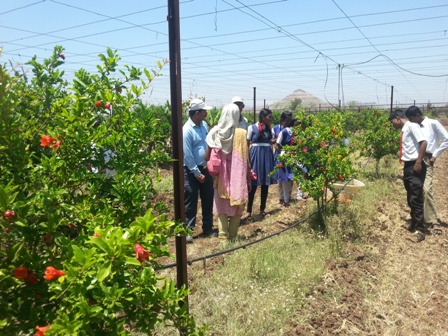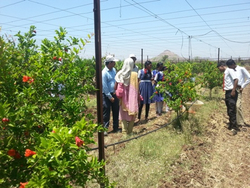People of Nashik promise to carry on the legacy of the Urban Nexus project

The Urban Nexus project created a remarkable impact on the city of Nashik, specially in Makhmalabad which was chosen as the place for pilot project implementation, in a short span of six months. The level of community involvement that this project witnessed is commendable. For the first time, as an outcome of the project implementations and initiatives, a tripartite agreement was signed between the local community, the Nashik Municipal Corporation (NMC) and ICLEI South Asia, taking responsibility for practicing energy efficient farm practices which reflected community ownership towards project. The project implementation of the GIZ funded, “Operationalization of Nexus Approaches in Metropolitan Regions” in Nashik, resulted in the adoption of various relatively common measures but in an integrated manner addressing multiple challenges using a cohesive, holistic approach.
An interlinked systemic approach including installation of ISI marked and Bureau of Energy Efficiency (BEE) approved energy efficient pumps to reduce consumption of electricity on the farms and groundwater recharging to maintain the water table has been undertaken. The development of biogas to reduce dependence on fossil fuels and energy input to agriculture in the ward area has also been promoted. Slurry from biogas is used for freti-irrigation thus reducing demands of chemical fertilizer as well. The importance of resource efficiency was propagated to a wider public through involving school children who were taken on a tour to an agricultural farm demonstrating organic farming practices.
Presence of the Mayor of Nashik, Mr. Yatin Wagh, during the inauguration of the newly installed pumps resonated political will and commitment of the city towards the project. Following the installation, a training and capacity building programme for farmers was organized which aimed towards sensitizing them towards the utilization of energy efficient pumps and adoption of efficient irrigation techniques such as drip and sprinkler in order to save energy and water, and thereby propagating the idea of “more crop per drop”. The training was facilitated with the help of professors from KK Wagh College of Agricultural Engineering and Technology. Handouts with guiding principles of pump management were developed in the local language (Marathi) and distributed among the farmers. Recognizing the benefits of this programme and its underlying discussions, a number of farmers have requested the Nashik Municipal Corporation (NMC) and ICLEI South Asia to conduct such discussions on a more regular basis.
"The Nexus project was crucial for Nashik Municipal Corporation to address the challenges our city faces with an integrated approach. By moving at the same time towards water, food and energy security, we have already managed to improve our resource productivity and system efficiency. The project has also helped us establish institutional linkages that were previously missing and create as well as build on synergies between different departments. We are leaving behind a centralized way of working and looking ahead towards a more integrated and resilient future”, said Mayor Wagh.
The final stakeholder meeting for the project also took place in August, which witnessed the participation of stakeholders from the various institutions and departments that were a part of this project. Several suggestions came up during the discussion with the stakeholders for moving forward such as rainwater harvesting, plantation programme for the entire city, terrace farming, urban and peri-urban agriculture practices, star rating of pumps, feasibility of solar pumps and cookers, grey water usage etc . The meeting ended with a pledge of multi stakeholder collaboration towards decision making for efficient resource utilization.
The objective of the Nexus project was to identify mutually beneficial responses from the inter-linkages between minimum of two sectors (water, energy, food) and provide an informed and transparent framework for determining trade-offs to meet demands without compromising sustainability and exceeding environmental tipping points.
Read more about the project here.
